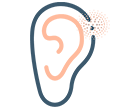Branchiootorenal Syndrome Precision Panel
Branchiootorenal Syndrome (BOR) is a rare autosomal dominant disorder that disrupts the development of tissues in the neck and causes malformations of the ears and kidneys. It is characterized by branchial arch anomalies, hearing loss and renal anomalies ranging from hypoplasia to bilateral renal agenesis.




